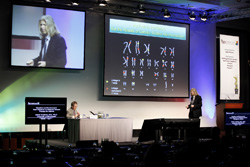
A presentation at RDD Europe
Delegates to RDD Europe 2013, which takes place May 21-24, will notice familiar features from past iterations of the event alongside several innovations designed to enhance the meeting experience.
The most obvious familiar element of RDD Europe 2013 is the location, the Intercontinental Hotel in Berlin Germany, which also hosted RDD Europe 2011. Co-organizers RDD Online and Aptar Pharma had previously announced that the 2013 meeting would take place in Athens, Greece; however, as the Greek economic crisis deepened, they became concerned that the political and economic instability would impact the conference.
Few hotels in European cities have large enough facilities to host the conference, notes says Pierre Carlotti of Aptar. Feedback from delegates to the 2011 meeting had been positive, he says, and the city offers easy access, so returning to Berlin appeared to be the most reasonable option. The 2011 meeting drew more than 450 attendees, and Carlotti says that based on the registration rate so far he is confident that they will have approximately the same number this year.
This will be the first year in which attendees at RDD Europe will be able to view the the scientific program and floor plans electronically using laptops or mobile devices, a system that, according to Richard Dalby of RDD Online, proved very popular at the RDD meeting in Phoenix last year. Delegates will be provided the wi-fi password during the first session and will have free access throughout the meeting.
As for the program itself, Dalby suggests that the sessions titled “Harmonizing the Clinical Requirements for LABA/ICS Combinations in the USA and Europe” and “Weighing the Evidence in Support of Bioequivalence” will attract a good deal of interest: “Almost all of the questions I get at the moment are regulatory questions about bioequivalence. It’s a big issue because a lot of companies are trying to make generic versions of products like Advair, and we don’t know how the FDA will regulate.”
In fact, regulators from the FDA will participate in both sessions. “It’s always interesting to get the FDA’s latest thinking,” he adds, “especially since Stephanie Kim is someone we have not heard from that often, and people always want to hear what Badrul Chowdhury has to say.” The session on LABA/ICS combinations includes regulators from MHRA and the Irish Medicines Board as well.


